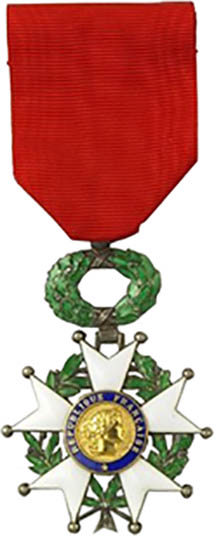
The Legion of Honour, or in full the National Order of the Legion of Honour is a French order established by Napoleon Bonaparte on May 19, 1802. Dr. Thomas W. Evans was presented the Knight rank of this highest decoration in France from Emperor Napoleon III.
More than 160 years ago, Dr. Thomas W. Evans earned commendations for his gold foil fillings at the Franklin Institute’s exhibition of arts and manufacture. But a chivalrous rescue of his patient, French Empress Eugénie (wife of Emperor Napoleon III), a successful effort to sway Louis Napoleon from recognizing the Confederacy during the final days of the Civil War, and an elevation from “Surgeon Dentist to the Emperor,” to Chevalier (Knight) rank in the French Legion of Honor, seemed slightly more exhilarating as a blog opener.
Explore the full breadth of fascinating facts behind this “American Dentist in Paris” in The Pennsylvania’s Gazette’s “Crowns & Confidences,” Nov|Dec 1999.) Better still, before November 8, plan a visit to Courtly Treasures: The Collection of Thomas W. Evans at the Arthur Ross Gallery at The University of Pennsylvania. The current exhibit displays the “trove of artwork and objets d’art that Evans collected during his years surgeon dentist to the Emperor Napoleon III,” more than 135 pieces in all.
While on campus, don’t miss a glimpse of the Evans building, what the school’s website touts as recognizing “the contribution of one of the great characters of the nineteenth century, Thomas Evans, dentist to the royalty of Europe, who gave a fortune and the site of his home to Penn for a dental institute and museum.” Entering through the Schattner Center entrance will allow a glimpse of Evans’ Landau carriage (shown above), the vehicle by which he transported French Empress Eugénie through a Parisian mob to safety in September 1870, after the emperor was captured during the Battle of Sedan.
According to the Gazette, “When the Thomas W. Evans Museum and Dental Institute opened at 40th and Spruce streets 100 years ago, the 87-year-old former empress wrote a letter to the dean of Penn’s dental school congratulating him on the ‘realization of the generous idea’ of her late friend Evans, whose fortune had funded the handsome facility. ‘I am reminded of his sincerity,’ she added, ‘the proof of which he gave me in the darkest hours of my life.'”
Though Hollywood producers purportedly opted out on what surely would’ve been a character of singular style and charisma (Evans could not be portrayed as a dentist for a film to be produced, according to Walter Cohen, former dean at Penn Dental School), those interested in his contributions to history, art and dentistry can read any of the books, magazines and newspaper articles his life inspired.

